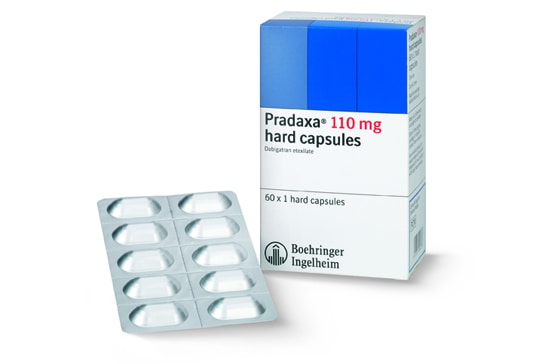
The safety of Boehringer Ingelheim’s anticoagulant Pradaxa has been placed under the spotlight once again by a British Medical Journal (BMJ) probe.
The journal claims Pradaxa (dabigatran) can lead to dangerous bleeding episodes because levels of blood plasma can vary between patients but – unlike the older drug warfarin – its label does not require periodic monitoring of blood coagulation.
Moreover, the BMJ investigations unit – along with researchers from the Institute for Safe Medication Practices (ISMP) in Pennsylvania and the University of Ottawa in Canada – suggest that current recommendations on the use of Pradaxa and other novel anticoagulants “may be flawed, because regulators did not see evidence showing that monitoring drug plasma levels could improve safety”.
The investigation claims that blood level monitoring and dose adjustment for Pradaxa could reduce the risk of major bleeding episodes associated with the drug by 30 to 40 per cent, citing information gleaned from freedom of information (FoI) requests and recent litigation over Pradaxa’s safety in the US.
It is further alleged that Boehringer withheld the data on plasma levels because it feared compromising the commercial success of the product, and the investigators claim that regulators “had concerns about the design and oversight” of the 18,000-patient RE-LY trial that underpinned its approval.
Boehringer has strongly refuted the claims made by the BMJ and launched a social media campaign yesterday to poke holes in the BMJ investigation’s findings, maintaining that its data “does not support dosing decisions for Pradaxa based on blood levels”.
The assertions levied in the BMJ “derive from a handful of documents and lawyer statements, which are allegations submissions and not the facts or conclusions of the case”.
The company can draw support from the recent verdict by the FDA in a post-marketing surveillance programme for Pradaxa, which concluded that the drug was superior to warfarin in reducing the risk of strokes in patients with atrial fibrillation, with a comparable rate of bleeding.
“The FDA has recognised that a patient on dabigatran does not require regular blood thinner testing,” insisted the company, although Thomas Moore, senior scientist at the ISMP, contends that bleeding is such a serious problem that improving it “deserved to be ranked as a patient safety issue of the first order”.
Boehringer retorts that its analyses demonstrated that monitoring “would not work since there was no way to come up with a range that would reduce major bleeding without materially compromising stroke reductions”.
It remains to be seen what the implications of the probe will be on Pradaxa from a clinical usage perspective, but the BMJ et al are calling for a blood testing requirement to be introduced in treatment guidelines and for a lower (110mg) dose of the drug to be made available in the US.
At the moment Pradaxa is only approved as a 150mg dose by the FDA, but the lower dose is available in the EU, Canada, Australia and New Zealand.
What is clear is that Pradaxa has continued to grow strongly since its launch in 2010, despite the FDA investigation into its safety and thousands of lawsuits alleging injury in the US that were finally settled for $650m.
Sales of the drug reached $1.6bn in 2013 despite competition from other new anticoagulants such as Bayer/Johnson & Johnson’s Xarelto (rivaroxaban) and Pfizer/Bristol-Myers Squibb’s Eliquis (apixaban).




